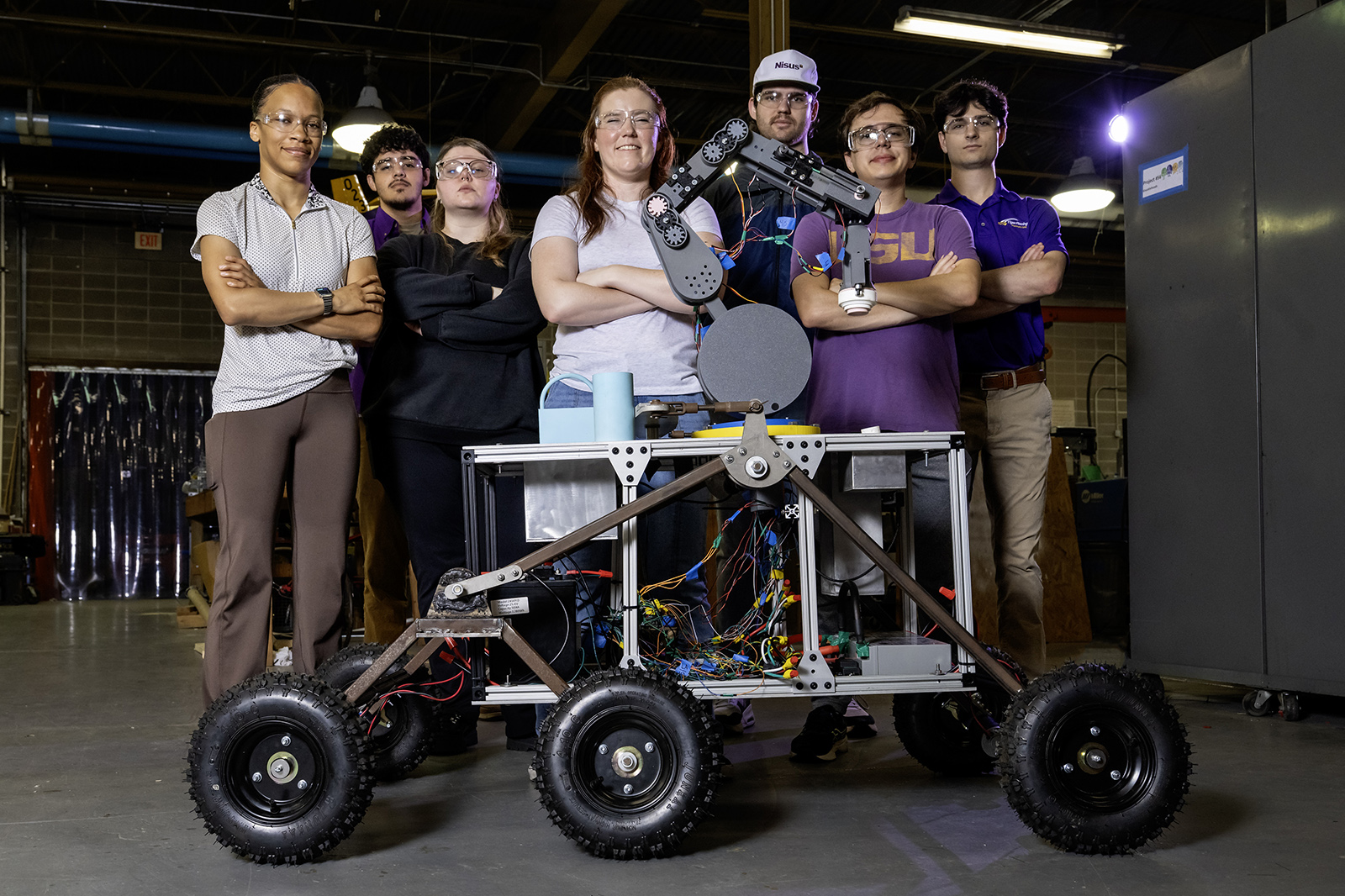LSU Team’s Remote-Controlled Rover Designed to Maintain Moon Systems with Minimal Human Risk
May 23, 2025
NASA is working toward a permanent presence of human and robotic explorers on the moon and beyond, but it will take innovative thinking to get there.
As part of their senior capstone project, a team of LSU engineering students has developed a versatile robot designed to support and maintain lunar systems while braving the harsh conditions of space, minimizing human intervention and risk.

Team members with the remote-controlled rover they designed.
The students were assisted by faculty advisors Assistant Professor Corina Barbalata and Senior Instructor Andrew Becnel, both of LSU’s Department of Mechanical and Industrial Engineering.
“The moon has remained a focal point in humanity’s pursuit of space exploration for decades,” said team member Terrilyn Legier, an LSU mechanical engineering major from Baton Rouge, La.
“Technologies such as the maintenance rover would allow scientists to explore areas of the moon that are inaccessible to humans, providing further insight into planetary formation, geological activity, and the potential for life beyond Earth.”
The LSU project was inspired by the 2025 NASA RASC-AL Competition, held annually for undergraduate and graduate university teams to design an innovative solution for a NASA goal. Team members were allowed to ask NASA representatives questions about the goals of the project before being left to their own devices.
The result is a rover that can be controlled remotely, equipped with an AI-assisted camera and a robotic arm with interchangeable tools: A claw to grab small objects and a brush to clean surfaces.
“We hope that future teams can take this prototype as a starting point and build off our ideas to develop an even more advanced and robust concept for NASA that could be utilized on the moon,” said Aidan Schuemann, an electrical and computer engineering major.
Fellow team member Miki Wynn, an electrical engineering major, said it took a coordinated team effort to accomplish the complex project, starting with defining the rover’s purpose and functions needed for its success.





“Throughout the process, we maintained strong communication and supported each other during testing and troubleshooting, making design and hardware changes as necessary,” Wynn said.
LSU capstone projects allow seniors to demonstrate their mastery of the knowledge and skills they've gained throughout their degree program.
“The lunar rover project is a powerful example of how future engineers engage with real-world challenges that demand innovation, extensive collaboration, and adaptability,” said Shane Tenorio, a mechanical engineering major. “It sheds light on the level of design complexity and problem-solving required to develop systems even at this small scale, especially where unexpected issues often arise and must be addressed in real time.
“As part of the department’s broader capstone initiative, it not only fosters groundbreaking ideas from fresh new minds but also equips students with the experience and mindset needed to enter and contribute meaningfully to today’s demanding engineering industries.”
Team Members
- Andrew Bienvenu, Electrical Engineering, Franklinton, La.
- Matvii Cheked, Mechanical Engineering, Kyiv, Ukraine
- Alphae LeBlanc, Electrical Engineering, Lafayette, La.
- Terrilyn Legier, Mechanical Engineering, Baton Rouge, La.
- Abigail Nealy, Mechanical Engineering, Baton Rouge, La.
- Aidan Schuemann, Electrical and Computer Engineering, Napa, Calif.
- Shane Tenorio, Mechanical Engineering, Gonzales, La.
- Miki Wynn, Electrical Engineering, Graham, N.C.
Next Steps
Let LSU put you on a path to success! With 330+ undergraduate programs, 70 master's programs, and over 50 doctoral programs, we have a degree for you.


